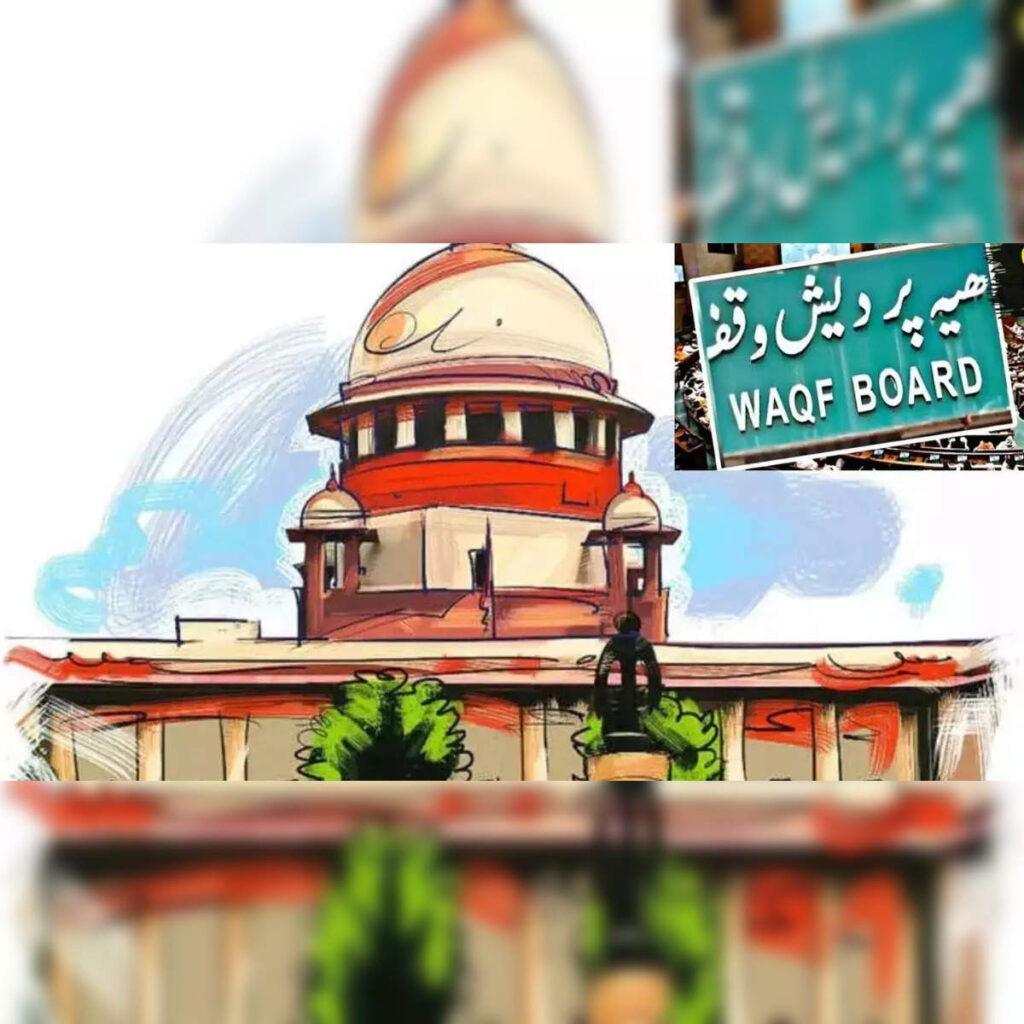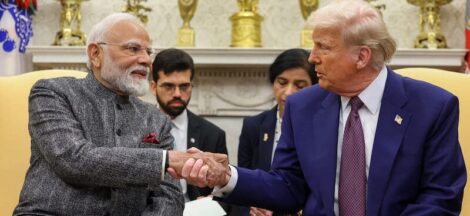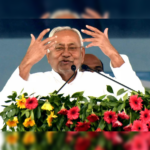By Narender Nagarwal
The ongoing challenges faced by Indian Muslims extend beyond the Unified Waqf Management, Empowerment, Efficiency, and Development Act, 2025, the legislation that replaces the Waqf Act of 1955. Central to their fight is the urgent need to uphold their right to live with dignity and to safeguard their religious, cultural, and customary practices.
This legislation conveys a strong message that Muslims should not anticipate the assurance of minimum basic human rights under the current system. The worries regarding the possible loss of Waqf assets are reasonable, especially considering historical patterns of state oppression against Muslims, which include the violation of religious sites, targeted attacks on places of worship like dargahs, and persistent interruptions to their cultural and religious observances, even during the holy month of Ramadan. This situation is further complicated by ongoing interference and hostility from state entities associated with the Sangh Parivar, which fosters an atmosphere of distrust and fear within the Muslim community.
Renowned Italian jurist Paulo Sandro has stated that constitutionality and legality run parallel to one another. Therefore, if a law enacted by Parliament is found to be in contradiction with established legal norms, it inevitably fails the test of constitutionality. It is incumbent upon parliamentarians to closely monitor the legislative process.
In several Supreme Court rulings, it has been emphasised that simply possessing a large majority in Parliament does not grant the State the authority to dismantle the foundational principles of the Constitution. India’s Constitution exists as a vibrant and evolving document, deeply connected to the protection of individual religious freedoms as well as the rights of religious and linguistic communities. It enables these minority groups to establish, sustain, and oversee institutions vital to their religious identities.
A key aspect of this framework is the right to manage religious trusts, which encompasses Waqf properties specifically allocated for Muslims. This right is strengthened by Article 26 of the Constitution, along with the protections afforded by Articles 25, 21, and 14. Although the State has the power to enforce regulations on these institutions, citing justifications like public order, morality, and societal welfare, it is essential that such regulations are developed with a careful understanding. The State must guarantee that any intervention does not infringe upon essential religious practices or jeopardise the fundamental purposes for which these trusts were originally created.
The constitutional provisions that safeguard the rights of Muslims in administering Waqf properties are explicit, outlining the boundaries within which State intervention is permissible. Various significant Supreme Court rulings have affirmed the autonomy of religious communities in managing their trusts.
A Waqf represents a profound and enduring commitment of either movable or immovable property by a Muslim, intended for religious, pious, or charitable purposes as recognized under Islamic law as an essential religious practice. In Karnataka State Board of Waqf v. Mohammed Nazir (1982), the Supreme Court held that ‘Waqf’ and ‘Trust’ or charity-related endowments share numerous similarities, but they can be distinguished in key respects. A Waqf always has a strong religious connection, and the motivation for donating the property is religious. The necessity for such motivation is often overlooked by Indian courts when making decisions in waqf cases. Whether it is possible to adhere to the law as laid out in the texts and to the need for a religious motive is a separate question. Thus, the institution of Waqf has a significant element of Islamic practice in India, where the management of Waqf properties plays a crucial role. Unlike secular administration, the governance of these properties is deeply intertwined with religious traditions and community welfare, emphasizing the sacred responsibility that accompanies such endowments. In M.P. Gopalakrishnan Nair v. State of Kerala (2005), the Supreme Court reiterated that if an institution is established primarily for religious purposes, its right to manage internal affairs and properties cannot be taken away under the guise of regulatory reforms.
It would be incorrect to suggest that Waqf is excluded from religious and cultural practices. Rather, Waqf is an essential component of these practices and holds significant importance within Islamic religious practice-among the five essential components. The management and administration of Waqf are integral to the freedom to oversee religious trusts.
Therefore, examining Waqf outside the context of Article 26 in conjunction with Article 25 would be a serious injustice to the principles of secularism and the rights of minorities.
Article 26 of the Constitution provides: “Subject to public order, morality and health, every religious denomination or any section thereof shall have the right— (a) to establish and maintain institutions for religious and charitable purposes; (b) to manage its own affairs in matters of religion; (c) to own and acquire movable and immovable property; and (d) to administer such property in accordance with law.”
The administration of Waqf, an Islamic religious endowment, squarely falls within the ambit of this provision. Clause (d) makes it clear that the right to administer religious property is a fundamental right subject only to “law”—and not arbitrary governmental overreach.
The State possesses the authority to regulate religious trusts, particularly those associated with minority communities like Muslims, but this power is not unrestricted. While Entry 28 of the Concurrent List allows the State to legislate on charitable and religious endowments, such legislative and executive actions must remain within the framework of constitutional norms. The administration of Waqf is not solely a secular responsibility but also intricately linked to the religious autonomy provided under Articles 25 and 26. The State must recognise the distinction between independent religious trusts and Waqf, as the nature and character of Waqf is fundamentally different from other religious trusts. Under the Waqf Act, the State serves as a fiduciary, managing Waqf properties on behalf of the minority community. Therefore, the trust of this community must be preserved and respected in the administration of Waqf.
The Constitution unequivocally grants every religious denomination the right to manage its own affairs in matters of religion and administer properties belonging to it. Article 26(d) protects the administration of religious property “in accordance with law,” but this phrase cannot be used as a carte blanche for the State to impose controls that obliterate the essential religious character of the institution. The notion of “regulation” must not be conflated with “takeover” or “substitution.” Any regulation that crosses the threshold of necessity and begins to erode the autonomy of the religious denomination violates the fundamental constitutional compact.
In the context of Waqf properties, this tension is acutely visible. The contentious Waqf (Amendment) Act, though ostensibly regulatory, could be used by State Waqf Boards and governments to exercise pervasive control over the appointment of Mutawallis, alienation of property, and management decisions, often sidelining the religious stakeholders themselves. This not only contravenes the spirit of Article 26 but also violates Article 25, which secures the right to profess, practice, and propagate religion, of which charitable religious acts like Waqf are a vital part.
Judicial pronouncements have consistently reaffirmed that while the State may introduce regulatory mechanisms to prevent maladministration, such mechanisms must not result in an outright usurpation of religious autonomy. In Sardar Syedna Taher Saifuddin v. State of Bombay (1962), the Supreme Court emphasized that the State cannot intrude into matters essential to religion. Similarly, in the landmark Shirur Mutt case (1954), the top Court held that the right to administer religious property is a fundamental right and cannot be eclipsed by arbitrary regulation under the garb of “public interest.”
In Ratilal Panachand Gandhi v. State of Bombay (1954), the Court held: “The administration of property by a religious denomination is a matter of religion under Article 26(b) and (d), and the State cannot interfere unless the regulation is in accordance with law and does not destroy the religious character or autonomy of the trust.”
Thus, while the Unified Waqf Management, Empowerment, Efficiency, and Development Act, 2025, is validly regulates the administration of Waqf properties, the implementation of this Act must remain within the bounds of Articles 25 and 26.
The Fifth Schedule of the Indian Constitution acts as a vital regulatory framework for the protection and empowerment of tribal communities, ensuring their autonomy, cultural preservation, and land rights within the designated Scheduled Areas. Codified under Article 244, it acknowledges the distinctive socio-cultural attributes of tribal populations and prescribes specific governance structures aimed at safeguarding their interests. Significantly, the provisions are inclusive of all tribal communities regardless of religious identity, thereby extending protections to Muslim tribal groups as well. However, the Waqf (Amendment) Act, 2025, poses a potential threat to this constitutional framework by bypassing the procedural safeguards that are explicitly outlined in the Fifth Schedule..
The Fifth Schedule limits the application of parliamentary laws that could threaten the traditional governance, land rights, and culture of tribal communities. Paragraph 4 mandates that Governors or Union Territory administrators consult the Tribal Advisory Council (‘TAC’) before extending central or state laws to these areas, ensuring tribal voices are included in decision-making. Importantly, the protections are religion-neutral, benefiting all Scheduled Tribes (‘STs’) regardless of their faith, including Muslim tribals in regions like Jammu and Kashmir or Lakshadweep. The TAC acts as a democratic safeguard against top-down policymaking. The requirement of the Governor consulting the TAC before implementing laws in Scheduled Areas is not a mere formality but crucial to ensure that laws consider tribal customs, land tenure systems, and socio-economic conditions. For example, laws concerning land acquisition or forest rights must be carefully discussed with the TAC to prevent undermining tribal autonomy.
Waqf properties, which often involve land holdings, may intersect with tribal territories governed by customary laws. For Muslim tribal communities, this presents a paradox: their religious identity does not diminish their tribal status or the protections afforded by the Fifth Schedule. Imposing the Waqf Act without TAC consultation undermines the constitutional mandate to prioritise tribal consent. Such an override disregards the requirements outlined in Para 4 and sets a troubling precedent that could erode the special status of Scheduled Areas.
The procedural safeguards of the Fifth Schedule, particularly the necessity of TAC consultation, are unequivocal and must never be compromised, even when laws intersect with religious issues. The direct application of the Waqf (Amendment) Act, 2025 to Scheduled Areas, without any mutual consultation, is fundamentally unconstitutional and untenable.
The Waqf (Amendment) Act includes an important provision stating that a Muslim must practice Islam for at least five years before being eligible to donate property for Waqf. This requirement raises questions, as individuals who embrace Islam after reciting the Kalma are considered Muslims immediately. Thus, the five-year condition may seem unnecessarily restrictive and could be reconsidered for inclusiveness.
Additionally, the Act specifies that government property cannot be designated for Waqf. While it is clear that a person can only donate property they own, this provision may create confusion about the intentions behind donations and could inadvertently paint a negative picture of the community involved in such charitable acts. A clearer understanding and perhaps a re-evaluation of these regulations could foster a more positive environment for Waqf donations and support the contributions of the community.
Empowering District Magistrates (‘DMs’) with adjudicative authority over Waqf property disputes poses a significant risk of exacerbating the usurpation of such properties. This shift could allow for the conversion of legitimate Waqf assets into contested properties merely on the basis of unfounded suspicions or applications from fringe elements. Such actions represent a direct challenge to the rights of the minority community and the integrity of Waqf properties. Historical precedent illustrates that right-wing organisations have colluded with DMs to target mosques, dargahs, and other Muslim places of worship.
It is perplexing that the legislation bestows such extensive powers upon DMs, effectively undermining judicial oversight and the specialised knowledge of Waqf boards. The centralization of authority via this Act contravenes Article 26 of the Constitution, which guarantees religious denominations the autonomy to manage their properties independently, a principle applicable to all communities. The Supreme Court’s ruling in Ratti Lal Gandhi v. State of Bombay (1950) emphasises the necessity for state intervention in religious administration to align with the proportionality test—something this legislation does not do. By relegating control to bureaucratic entities, this Bill severely compromises the rights enshrined in Article 30, which protects the ability of minorities to oversee their institutions without unwarranted state interference.
The Supreme Court, through expansive judicial interpretation, has transformed Article 21 into a cornerstone of human dignity, autonomy, and substantive due process. In Maneka Gandhi v. Union of India (1978), the Court held that the “procedure” under Article 21 must be “fair, just, and reasonable,” thereby infusing the guarantee with principles of non-arbitrariness and proportionality. The right to life, as articulated in Francis Coralie Mullin v. UT of Delhi (1981), transcends mere animal existence, encompassing the “right to live with human dignity,” inclusive of access to education, health, and cultural integrity.
This jurisprudential evolution extends to the protection of religious freedom under Article 25, which the Court has harmoniously construed with Article 21. In Commissioner, Hindu Religious Endowments v. Sri Lakshmindra Thirtha Swamiar (1954), the Supreme Court recognised that the protection of property rights of religious institutions ensures that state regulation does not infringe upon the management and administration of religious properties, thereby safeguarding the economic autonomy of religious entities. The decision also introduced the principle that religious institutions have the autonomy to manage their own affairs in matters of religion and doctrine, ensuring that the state does not encroach upon religious freedoms.
If we expand Article 25’s interpretation, it is clear that religious practices including the right to donate for the Waqf integral to faith. For Muslim communities, Waqf properties are essential for exercising these liberties. Mismanagement or arbitrary state control over Waqf assets, as cautioned in Board of Muslim Waqfs v. Radha Kishan (1979), risks depriving communities of resources vital for maintaining mosques, educational institutions, and religious rituals, thereby endangering their right to practice religion with dignity.
Under Entry 28 of the State List, “Charities and charitable institutions, charitable and religious endowments, and religious institutions” fall exclusively within the legislative domain of States. The administration and regulation of Waqf Boards, constituted under the Waqf Act, 1995, pertain intrinsically to religious endowments, squarely aligning with Entry 28. However, the (Amendment) Act, by empowering the Union government to unilaterally issue directives to State Waqf Boards (for instance under Section 9A or analogous provisions), encroaches upon the States’ exclusive legislative and executive authority, violating the constitutional scheme of federalism.
The Supreme Court in S.R. Bommai v. Union of India (1994) underscored federalism as part of the basic structure of the Constitution, mandating respect for the demarcated spheres of governance. The Union’s imposition of supervisory control over State Waqf Boards through mechanisms like centralised audits, directives, or dismissal of State-appointed functionaries usurps the States’ autonomy to manage their religious endowments, as affirmed in State of West Bengal v. Union of India (1963). While the Waqf Act is enacted under Entry 28 of the Concurrent List (‘Charities and charitable institutions’), the (Amendment)’s operational overreach into State Waqf Boards’ day-to-day governance exceeds the Union’s concurrent authority, transforming it into impermissible “legislative imperialism”. Such centralisation contradicts the federal balance, violating Article 246(3), which reserves exclusive legislative power over State List subjects to States, barring a constitutional exception under Article 252 or 249. Thus, the Amendment unconstitutionally subverts State sovereignty.
The current iteration of the Waqf (Amendment) Act 2025 fails to uphold the principles of reasonable classification and undermines the principles of secularism and federalism.
The preservation of diversity is a fundamental aspect of the framework of minority rights as outlined in the Indian Constitution. In light of the recent Waqf (Amendment) Act 2025, it is vital to reflect on Franklin Roosevelt’s assertion that “no democracy can long survive which does not recognize the rights of minorities as fundamental to its very existence.”
The right of Muslims to oversee and administer Waqf properties is firmly anchored in the constitutional guarantees enshrined in Articles 26, 25, 21, and 14 of the Constitution. While regulatory measures are permissible, they must be aligned with principles of transparency, accountability, and public welfare, rather than serve as instruments for interfering with or reshaping religious practices. The State is not entitled to dismantle the core tenets governing Waqf under the guise of reform. The Supreme Court has consistently upheld the autonomy of religious communities in managing their institutions, provided such management adheres to laws that are just, minimally intrusive, and constitutionally sound. Consequently, any significant encroachment on the administration of Waqf properties—whether through bureaucratic control, diminishing community representation, or institutional restructuring—should be scrutinised through the prism of constitutional morality and established judicial precedents. (IPA Service)
Courtesy: The Leaflet




 Bihar BJP Is Deliberately Spreading Rumour About Nitish Kumar’s Shift To Centre
Bihar BJP Is Deliberately Spreading Rumour About Nitish Kumar’s Shift To Centre 